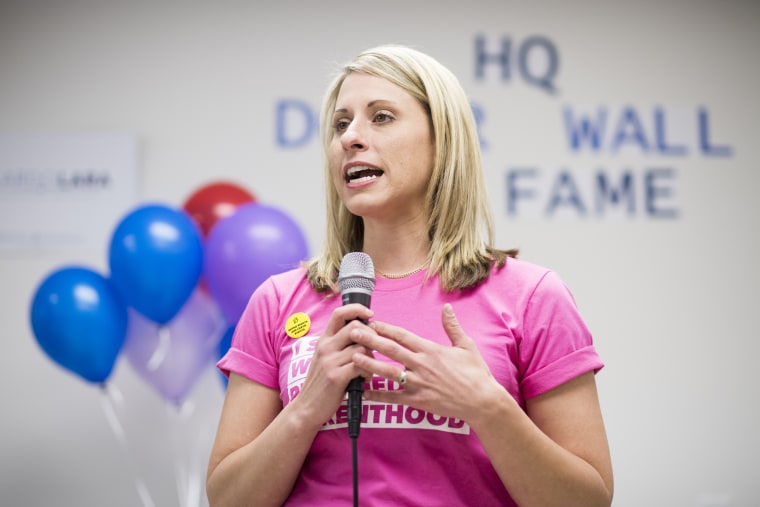WASHINGTON — More than 90 percent of House Democratic candidates in top races outraised their Republican rivals over the past three months as Democrats continue to hold a substantial fundraising edge with less than a month to go before Election Day.
New fundraising figures filed with the Federal Election Commission show that Democratic candidates more than doubled Republican fundraising in the 108 districts considered the most competitive by the nonpartisan Cook Political Report. In some cases, challengers outraised Republican incumbents by a factor of three or more.
Fundraising success is far from a direct predictor of electoral success — some Democratic candidates in high-profile special elections earlier this cycle fell short despite their cash advantages. And some of these Republican incumbents are still in strong shape despite their fundraising deficits.
But the Democratic fundraising advantage will help the party hammer its message home in the final weeks of the campaign season and could help give campaigns in some of the tightest races finish strong.
The average Democratic House candidate across these districts raised $1.48 million last quarter, from July through September, and has $959,000 banked away for the rest of the election.
By comparison, the average Republican candidate in these districts raised $559,000 over that same period and has $817,000 left in the bank.
That significant fundraising gap is driven by a bevy of candidates who posted eye-popping hauls last quarter.
Sixty-one candidates in these top races raised more than $1 million. Of those, 19 raised between $2 million and $3 million; seven raised between $3 million and $4 million; and two raised more than $4 million.
The two who raised more than $4 million — California's Gil Cisneros and Pennsylvania's Scott Wallace — did so by banking on large personal loans. Cisneros gave his campaign $3.5 million while Wallace loaned his $4 million.
And they put that money to work, each spending almost $5 million over the past quarter in their elections against California Republican Young Kim and Pennsylvania Republican Rep. Brian Fitzpatrick respectively.
Overall, the party has its top 16 fundraisers in races for GOP-held seats that are rated as "toss-ups" or seats Cook rates more likely to change parties in the fall.
California's Katie Hill raised the most after the self-funders with $3.8 million in her bid against GOP Rep. Steve Knight. Knight raised just $456,000 last quarter and has $419,000 on hand, while Hill still has $2.4 million banked away.
Republicans have long been worried about their incumbents not kicking their campaigns or fundraising operations into gear. After GOP nominee Rick Saccone lost an early 2018 special election in a deep-red district, top Republicans delivered stern warnings to their members about the need to step up their games.
Some Republicans heard the warnings and boosted fundraising through 2018, improving their fortunes, while others kept up the strong campaigning to keep themselves in good shape as they look to hold onto their seats.
But some are still falling short, as 31 Democratic challengers have more cash on hand than GOP incumbents.
One Republican incumbent who vastly improved his fundraising was Rep. John Culberson, who is running in a very competitive race against Democrat Lizzie Pannill Fletcher. This past quarter, Culberson raised $800,000, his largest quarter in his almost two decades as a House candidate.
Even so, Pannill Fletcher raised $2.3 million last quarter and has more cash on hand than the incumbent.
A recent poll by the New York Times and Siena College found Culberson up just 3 points over the Democrat.
Fellow Texas Republican Rep. Will Hurd raised more money this past quarter than any incumbent facing competitive reelection with $1.5 million. That strong fundraising ability has helped him run a strong race against another well-funded Democratic challenger, Gina Ortiz Jones, as polls show Hurd leading that race.
With Republicans looking at far fewer offensive opportunities than the Democrats are, there are just two seats where Republican challengers outraised Republican incumbents.
Arizona Republican Wendy Rogers outraised Democratic Rep. Tom O'Halleran by $100,000 last quarter, and California Republican Elizabeth Heng outraised Democratic Rep. Jim Costa by more than $200,000.
Both races are rated "likely Democratic" by the Cook Political Report and the Democratic incumbents still lead in cash on hand.
And the two Republican incumbents under indictment, New York Rep. Chris Collins and California Rep. Duncan Hunter, were both massively outraised by their Democratic rivals, which complicates their electoral landscape.
While there's still a Democratic fundraising edge in the race for the Senate, the advantage is less pronounced. Candidates on both sides of the aisle will have the resources to run through the finish line—especially as outside groups continue to pour money into the key races.
The average Senate Democrat in the 17 most competitive races ranked by Cook raised $5.9 million last quarter and has $5.1 million in cash on hand.
That total includes Texas Democratic Rep. Beto O'Rourke's unprecedented $38 million quarter—not including O'Rourke's haul, Democrats raised $3.9 million on average.
On the other side of the aisle, the average fundraising for GOP Senate nominees this past quarter is $4.8 million, a figure that includes the $18 million that Florida Gov. Rick Scott loaned himself and the $8.5 million loaned by New Jersey's Bob Hugin, that average drops to $3.2 million. GOP Senate candidates have an average of 2.8 million in the bank for the final stretch.
After O'Rourke, two Democratic Senate candidates raised more than $7 million last quarter — Missouri Democratic Sen. Claire McCaskill and Nevada Rep. Jacky Rosen. Their opponents, Missouri Republican Josh Hawley and Nevada Sen. Dean Heller, raised $3.2 million and $2.2 million respectively.
Not including the self-funders, Texas Sen. Ted Cruz paced the GOP field with $11.6 million raised last quarter. Indiana Republican Mike Braun raised $5.6 million, which includes the $2.4 he loaned his campaign, and Arizona Rep. Martha McSally raised $4.9 million.
